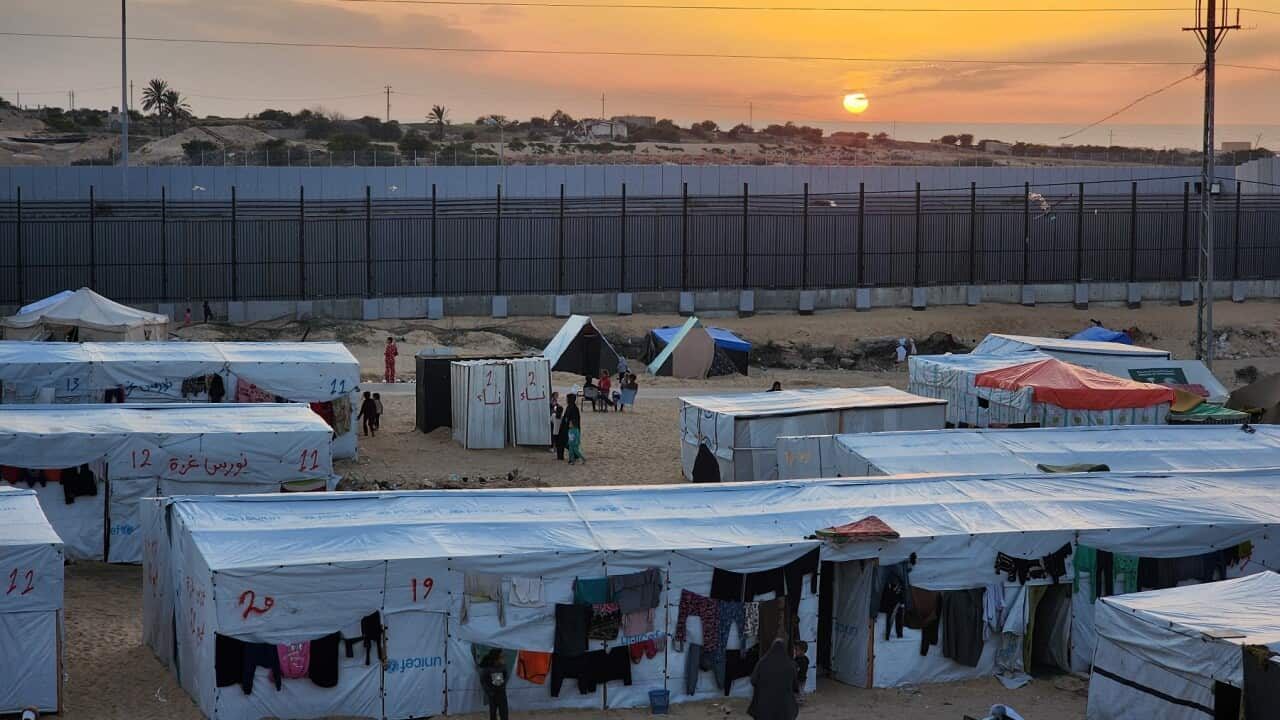TRANSCRIPT
A number of Palestinian women and children have had their visitor visas cancelled by the Australian Government in transit to Australia.
Advocacy group Palestine Australia Relief and Action, known as PARA, has been supporting family members of Australians trying to leave Gaza.
PARA co-founder Rasha Abbas says a number of people who were issued Australian visas, underwent security checks, and managed to get out of Gaza through the Rafah Crossing into Egypt and the boarded flights to Australia in recent days, but have had their visas cancelled.
"We've now received several escalations about families who have been returned or stopped in transit airport and made to return back to Cairo. We had two cases we are supporting and we've booked flights for that have been stranded in airports including a mum with four very young kids."
Ms Abbas says the people are in a treacherous position.
"Those are families that paid their life savings, or their families here in Australia took loans or sold their own assets to pay for those dear family members to be able to exit Gaza. So they arrive in Egypt with literally not much left with them and with the hope of being able to join their family members here in Australia."
The subclass 600 visitor visa was issued to the Gazans hoping to reach Australia - the same visa that was available to people fleeing the war in Ukraine.
SBS News has seen a number of these visa cancellation notices, which say “the delegate considered you never intended a genuine stay temporarily in Australia and therefore the visa was granted based on circumstances which never existed.”
Ms Abbas says PARA was instructed to apply for this type of visa, and they were valid until the people began the final transit to Australia.
"So these are visas temporary visas that has been issued back in November to a number of those family members, and it took a while for them to be able to exit from Gaza. So these are valid visas to Australia checked all the way till the last minute before they arrive or at the airport and those are visas that has been cancelled either at the airport when people are checking in or in transit."
Home Affairs Minister Clare O'Neil has declined SBS interview requests.
In a statement she refused to comment on individual cases but said:
“All visa applicants undergo security checks and are subject to ongoing security assessments. The Australian government reserves the right to cancel any issued visas if circumstances change."
Samah Sabawi, also from Palestine Australia Relief and Action, is in Cairo, and has been supporting a number of women who found themselves stranded.
She says it's unclear what they're meant to do now.
"So now we have all these people here? And we don't know if we should book them flights to Australia? And if not, then what are they? What are we gonna do with them here? What are the options? I have no idea. There's so much uncertainty."
The issue has become political.
The Opposition has long warned against issuing visas for Gazans - raising concerns about security risks.
Liberal Leader Peter Dutton says there should be more stringent checks for people fleeing the Palestinian territories.
“The circumstances here, I think, are pretty dire. I've said before, I don't think it's a good idea, or in our country's best interest for people to be brought out of a war zone into our country when we don't have certainty around travel documents, or identity, around affiliation, sympathies. Hamas is a listed terrorist organisation in our country, and I'm sure the vast majority of people who would be applying for a visa, just want a better start in life, but we need to make sure that anybody who's coming to our country's not going to pose a threat.”
Greens leader Adam Bandt says the government should be doing more.
"When a few people are able to make it out and come to safety here in Australia, the government should support them instead of turning them back on grounds that they won't even make clear."
When pressed on the issue, Prime Minister Anthony Albanese has defended the visa cancellations.
"Well, this has been a difficult situation for people, and I understand that it's a very difficult circumstance for families. The government makes these decisions and advice based upon individuals."
Ms Sabawi says it's a challenging time for the families.
"For us as Australian citizens is that we were put in this position by our government, where we were given the hope that we can save the lives of our loved ones. And so now we have to face up to them and say, We're sorry, we're just gonna go on living our privileged lives. Meanwhile, you know, too bad. Yes, you are my father, you are my mother, you are my sister, you are my brother. But for some reason, you're a security threat. Or for some reason, you don't deserve. You don't deserve to have the life that I have."
And she hopes there will be certainty soon.
"We need our families to matter. We need this government to give us certainty. We need them to stop making everything so vague, and then us finding out mid-air if somebody is going to be saved or sent back to the inferno."













